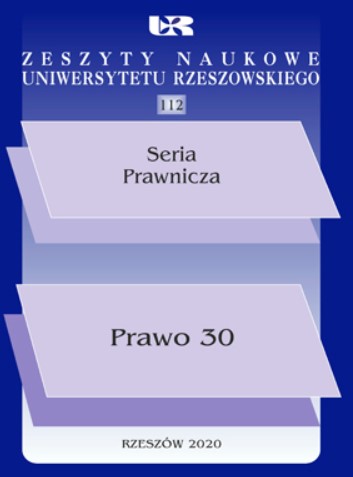MOŻLIWOŚĆ PRYWATNEJ REJESTRACJI PRZEBIEGU POSIEDZENIA SĄDOWEGO JAKO PRZEJAW REALIZACJI ZASADY JAWNOŚCI WEWNĘTRZNEJ W POSTĘPOWANIU CYWILNYM. UWAGI W ŚWIETLE NOWELIZACJI KODEKSU POSTĘPOWANIA CYWILNEGO DOKONANEJ USTAWĄ Z DNIA 4 LIPCA 2019 R.
PRIVATE RECORDING OF A HEARING AS AN IMPLEMENTATION OF INTERNAL TRANSPARENCY PRINCIPLE IN CIVIL PROCEDURE. REMARKS IN THE LIGHT OF THE AMENDMENT TO THE CIVIL PROCEDURE CODE OF 4 JULY 2019
Author(s): Barbara CisSubject(s): Constitutional Law, Civil Law
Published by: Wydawnictwo Uniwersytetu Rzeszowskiego
Keywords: transparency principle; internal transparency principle; recording of a court hearing; sound recording; a right to fair trial;
Summary/Abstract: The possibility of private recording of the course of court hearings and other judicial acts performed with the participation of the parties or participants in proceedings despite its seemingly technical dimension is an important element of the openness of civil proceedings in its internal aspect and significantly implements the right to a fair trial guaranteed not only by the Polish Constitution but also by acts of international law. By the Act of 4 July 2019 amending the Act – Code of Civil Procedure and certain other acts (Journal of Laws of 2019, Item 1469, as amended), the legislator repealed the article 1621 of the Code of Civil Procedure which had been added to the Code of Civil Procedure by the Act of 10 July 2015 amending the acts – Civil Code, Code of Civil Procedure and certain other acts (Dz.U. 2015, Item 1311, as amended). The abovementioned regulation has been replaced by the added regulation of article 91 of the Code of Civil Procedure. In the concept of the legislator, this amendment was to extend the possibility of recording the court hearings in order to meet public expectations regarding the transparency of the operation of the judicial system. However, the admissibility of the private recording of the course of the court hearing and other judicial acts still is the subject of relevant limitations in the form of the absolute exclusion of the possibility for the parties to record the hearings held in camera or to record the image. The considerations are aimed at presenting the amended regulations and attempting to assess its significance and impact on the implementation of the principle of transparency in civil proceedings in its internal sense.
Journal: Zeszyty Naukowe Uniwersytetu Rzeszowskiego - Seria Prawnicza
- Issue Year: 2020
- Issue No: 30
- Page Range: 85-104
- Page Count: 20
- Language: Polish

